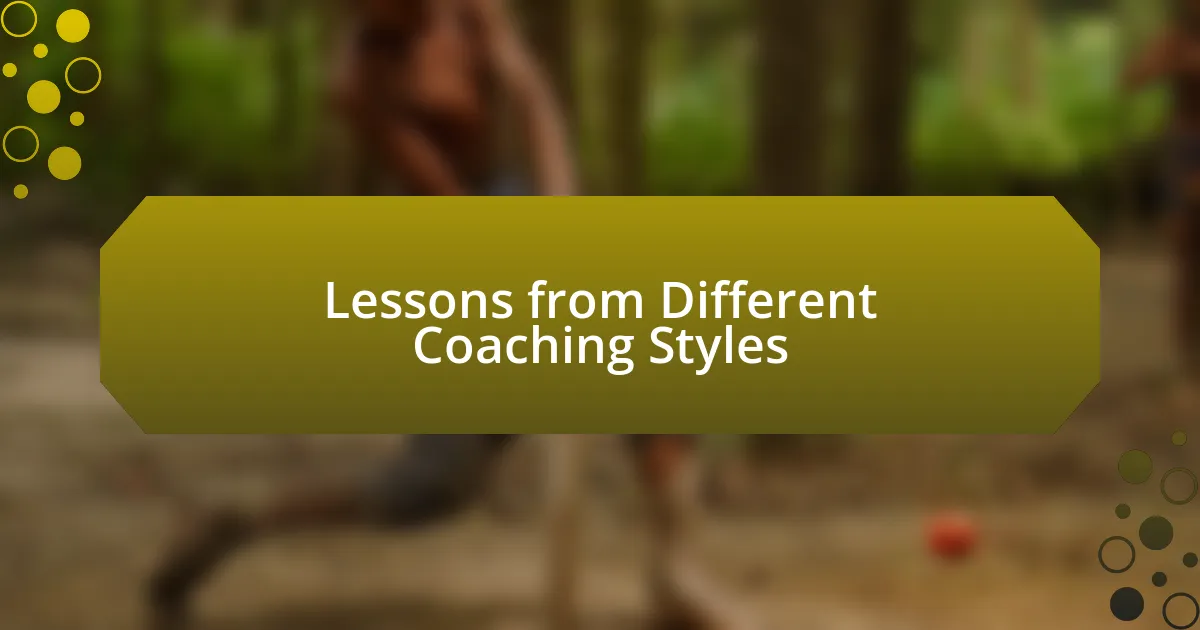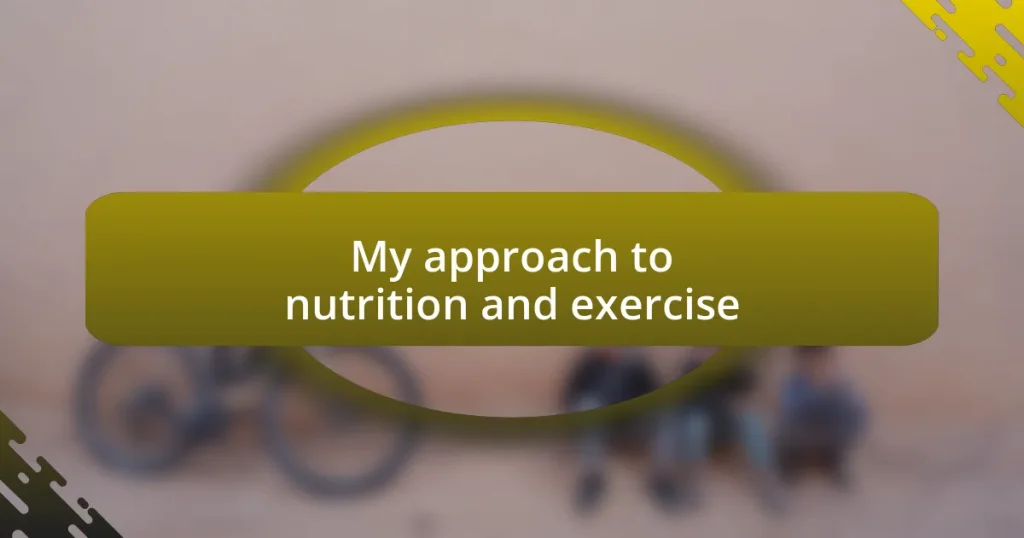Key takeaways:
- Coaching enhances personal and professional growth by providing accountability, goal clarity, and tailored feedback.
- Effective coaches demonstrate empathy, adaptability, and strong communication skills, fostering trust and open dialogue.
- Different coaching styles offer valuable lessons, blending directive and supportive approaches to meet diverse needs.
- Building lasting relationships with coaches relies on trust, communication, and mutual respect, empowering individuals to pursue their goals.

What is Coaching Importance
Coaching plays a vital role in personal and professional development, acting as a guide who empowers individuals to reach their full potential. I remember when I was first introduced to a coaching program; it felt like a door opened, revealing tools that I never knew I needed. Have you ever felt stuck, unsure of your next steps? A good coach can help you clarify your goals and create a roadmap to achieve them.
What stands out to me is the way coaching fosters accountability. I once worked with a coach who challenged me to set measurable objectives. This simple shift made a huge difference. Suddenly, I wasn’t just dreaming about success; I was actively pursuing it. Isn’t it incredible how having someone to share your aspirations with can ignite motivation?
Moreover, coaching isn’t just about skill-building; it’s about transformation. I’ve witnessed friends and colleagues emerge from their shells after engaging with a coach. Their confidence soared as they learned to navigate challenges more effectively. It makes me ponder: how impactful would coaching be for you, providing not just insights, but the belief in your ability to adapt and grow?

Benefits of Having a Coach
Having a coach can truly transform your outlook and approach. I remember a time when I struggled with making decisions, often feeling overwhelmed. My coach helped me break down my options, guiding me to see each choice more clearly. It was like lifting a fog that had clouded my judgment. Coaches provide a fresh perspective, allowing individuals to see potential pathways that might be hidden in daily routines.
The benefits of having a coach extend beyond just personal development; they can significantly enhance professional growth as well. Here are some key advantages:
- Accountability: Coaches hold you responsible for your commitments, ensuring you stay on track.
- Goal Clarity: They help define what you truly want and how to get there.
- Tailored Feedback: You receive personalized insights that resonate with your unique situation.
- Confidence Boost: A coach can elevate your self-belief through encouragement and support.
- Skill Development: They assist in honing specific skills tailored to your career or personal aspirations.
Each of these benefits highlights how a coach isn’t just a mentor but a partner in navigating the journey toward success.

Key Qualities of Effective Coaches
Effective coaches embody several key qualities that allow them to significantly impact those they lead. One essential quality is empathy. I recall a time when my coach took the time to understand my challenges, which created an atmosphere of trust. This understanding made me more receptive to feedback and guidance, strengthening our working relationship.
Another critical quality is adaptability. Effective coaches read the room and adjust their strategies based on the needs of their clients. For instance, during my coaching sessions, my coach often modified our approach based on how I was feeling. Whether I was energetic or overwhelmed, this adaptability made our conversations much more productive.
Finally, strong communication skills are paramount. I learned that being able to convey ideas clearly and listen attentively fosters an environment where individuals feel valued. A great coach articulates their thoughts in a way that resonates, making complex concepts accessible and encouraging open dialogue. It’s a skill I strive to emulate in my own interactions.
| Quality | Description |
|---|---|
| Empathy | Understanding and sharing the feelings of their clients, creating trust. |
| Adaptability | Adjusting coaching techniques to meet the evolving needs of clients. |
| Communication Skills | Clearly articulating ideas and actively listening to foster open dialogue. |

Lessons from Different Coaching Styles
Different coaching styles bring a variety of lessons that can shape our growth. For example, I once had a coach who was incredibly directive. At first, I found the strict approach a bit stifling, but I soon realized that the structure helped clarify my objectives. Have you ever felt overwhelmed by too many choices? That clear guidance allowed me to focus on what truly mattered.
On the other side of the spectrum, I experienced a coaching style that was more laid-back and conversational. This approach encouraged me to explore my thoughts freely, which often led to profound self-discoveries. I remember one session where I just talked about my fears without any preconceived agenda. That moment opened doors for insights I wasn’t even aware I needed. Isn’t it amazing how a relaxed atmosphere can sometimes yield the best breakthroughs?
Another lesson I learned came from a coach who blended styles effectively. They alternated between being authoritative and supportive, teaching me the value of versatility. I recall an instance when they recognized a moment of struggle and shifted to a more encouraging tone, which helped me regain my confidence. Doesn’t it make sense that the blend of styles can meet diverse needs and foster an inclusive environment for growth?

Personal Growth Through Coaching
Navigating my personal growth through coaching has been a transformative journey. One vivid memory that stands out is when a coach guided me through a particularly challenging setback. Instead of merely providing solutions, they asked thought-provoking questions that forced me to reflect on my failures. It was tough at the moment, but with time, I realized that embracing vulnerability led to significant resilience. Have you ever faced a situation where confronting your weaknesses became your greatest strength?
Additionally, I found that coaching helped me develop a greater sense of self-awareness. I recall being in a session where my coach pointed out a recurring pattern in my decision-making. At first, I felt defensive; who wants to confront their flaws? Yet, as we delved deeper, I discovered that recognizing these patterns was the first step to breaking free from them. It was eye-opening! Doesn’t it resonate with you that awareness is often half the battle in personal growth?
Moreover, coaching taught me the importance of setting boundaries—not just with others but also within myself. During one session, I shared my struggle with work-life balance, and my coach encouraged me to articulate my limits clearly. This was not only about prioritizing my well-being but also about respecting my own time and energy. Who knew that stating “no” could be a form of empowerment? Each of these lessons has contributed to a profound evolution in how I perceive personal growth.

Applying Coaching Insights in Life
Applying coaching insights in life has truly reshaped how I approach daily challenges. One particular instance comes to mind: during a coaching session, my coach encouraged me to adopt a growth mindset, emphasizing the power of curiosity over fear when facing new tasks. I remember the first time I applied this—entering a meeting filled with apprehension but choosing instead to ask questions and learn. That experience not only boosted my confidence but also fostered deeper connections with my colleagues.
Another essential insight from coaching is the value of accountability. In a coaching session, we developed a plan where I committed to small, achievable goals. I still visualize marking off each item on my list—it feels like a mini victory each time. How incredibly motivating is it to see progress rather than perfection? Making those commitments to myself and sharing them with others has sparked a newfound determination in my life.
Lastly, I can’t underestimate the power of visualization that I picked up from my coach. One day, I was struggling with imposter syndrome, feeling unworthy of my achievements. My coach suggested I visualize my future self, confident and fulfilled, walking through my professional and personal life. That exercise transformed my perspective and instilled a sense of hope and possibility. Have you ever visualized your best self? It’s a powerful tool that makes the concept of success feel tangible and closer to reach.

Building Lasting Relationships with Coaches
Building lasting relationships with coaches hinges on trust and open communication. In my experience, I found that sharing not just my goals but also my fears with my coach deepened our connection. When I laid bare my anxieties about success during a session, it felt like I was allowing them into my world, and in return, I received invaluable insights and support.
It’s also essential to be present and engaged during coaching sessions. I recall a time when I wasn’t fully committed, distracted by external pressures. After expressing this to my coach, we turned that session into an honest dialogue about balance and priorities. That level of transparency turned a routine meeting into a pivotal moment in our relationship. Have you ever allowed vulnerabilities to shape the conversation with your coach? It’s often in those moments of honesty where the strongest bonds are forged.
Finally, mutual respect plays a crucial role in nurturing a long-term coaching relationship. My coach always respected my autonomy, allowing me to make choices while guiding me gently. I remember a specific project I hesitated to take on. Rather than pushing me, my coach helped me weigh the pros and cons, fostering a sense of ownership that empowered me. When both parties are invested and respect each other’s journeys, the relationship flourishes.













